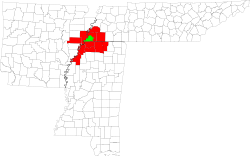Memphis, Tennessee Metropolitan Area
| Memphis Metropolitan Area | |
|---|---|
| Memphis-Forrest City TN-MS-AR Combined Statistical Area | |
 |
|
| Coordinates: 35°N 90°W / 35°N 90°W | |
| Country | United States |
| State(s) |
Tennessee Arkansas Mississippi |
| Largest city | Memphis, Tennessee(656,861) |
| Other cities |
Bartlett, Tennessee(58,264) Southaven, Mississippi(51,824) Collierville, Tennessee(48,655) |
| Area | |
| • Total | 3,013 sq mi (7,800 km2) |
| Population (2013 est.) | |
| • Total | 1,341,746 |
| • Rank | 41st in the U.S. |
| • Density | 426.7/sq mi (164.8/km2) |
The Memphis-Forrest City Combined Statistical Area, TN-MS-AR (CSA) is the commercial and cultural hub of The Mid-South or Ark-Miss-Tenn. The census defined combined statistical area covers ten counties in three states – Tennessee, Mississippi, and Arkansas. As of census 2010 the MSA had a population of 1,324,108 [2]. The Forrest City Micropolitan area was added to the Memphis area in 2012 to form the Memphis-Forrest City Combined Statistical area and had a population of 1,369,548 according to census estimates. The greater Mid-South area as a whole has a population of 2.4 million according to 2013 census estimates.[3] This area is covered by Memphis local news channels and includes the Missouri Bootheel, Northeast Arkansas, West Tennessee, and North Mississippi.
The Memphis Metro area is known locally as the Mid-South. Culturally the Mid-South is more associated with the Deep South and even more specifically the Mississippi Delta than it is the Upland South, which is the case with Tennessee's other large cities. Memphis is the largest city in the Deep South, third largest in the Southeastern United States, and eighth largest in the Southern United States as a whole. African-Americans make up nearly half the population of the metro area. The Mid-South has the highest percentage of African-Americans of all large metro areas with at least a million people. It is second when metro areas of under a million people are factored in after the Jackson-Vicksburg-Brookhaven, MS Combined Statistical Area. The metro area is blue collar in nature and most of its growth can be attributed to its logistical infrastructure. Recently, however, more companies with technology backgrounds such as Electrolux and Mitsubishi have begun making inroads in the Memphis area.
...
Wikipedia
